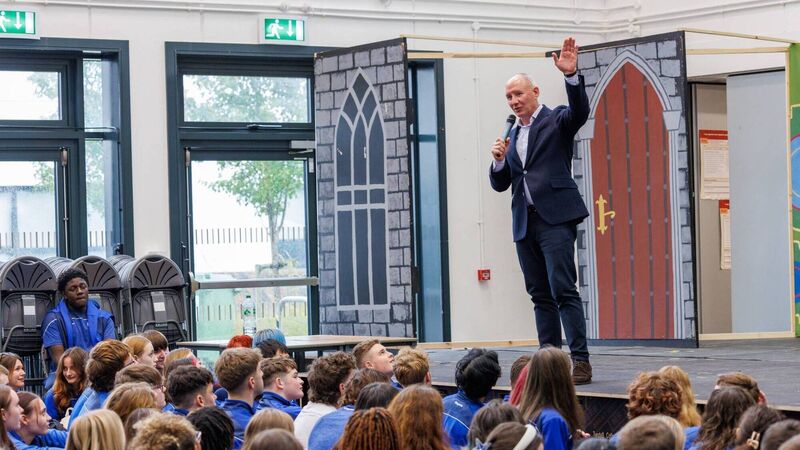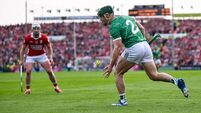Kieran Shannon: Jim Gavin a great football man not cut out for the senior hurling of politics

Jim Gavin speaks to the students of Tyndall College in Carlow
It should have been one of his finest hours, a crowning achievement, a public coronation.
It turned out to be his darkest hour, a public humiliation.
Truly, a weekend like this past one can be a long time in politics.
Last Saturday morning in Croke Park, the Football Review Committee that Jim Gavin chaired had every one of its proposed rule changes approved and adopted by the GAA’s Special Congress.
It was the culmination of 20 months’ work which will continue to serve as a case study and masterclass in consultation and change management. At the start of the process almost everyone was agreed that football had to change but almost everyone had a different opinion as to how it should change. Under almost anyone else it would have had limited impact, like a string of its predecessors. Under Gavin it was radical, transformational.

Colleagues who were once his adversaries realised why his troops constantly had the edge over theirs in so many keenly and often closely contested battles. He was their edge with his eye for detail along with a capacity to bring people with disparate views and personalities and wield them into a synergetic collective unit serving a common higher purpose. Almost to a person, from Colin Collins to Éamonn Fitzmaurice, various FRC members have been like the character declaring at the end of a George Bernard Shaw play about another: What a man!
Clearly that did not go unnoticed by Micheál Martin and Jack Chambers.
Gavin would never have been considered or approached as a presidential candidate were it not for his work with the FRC.
Winning five All-Irelands in a row and six in seven years may have been as impressive an achievement as all the reforms he ushered through as FRC chair but the joy and benefits of that success were solely confined to a limited constituency: Dublin.
The FRC, or at least the sport it served, saved and enhanced, was made of a much wider, larger church: north men, south men who he made comrades all, not just those from Dublin but Belfast, Mayo, even Michael Murphy and Donegal. The FRC had shown he could command more than the dressing room. He could command a committee room. And there the consensus and authority he elicited was, in a word, presidential.
And if he could do the state of Gaelic football such service, Martin and Chambers calculated, he could serve the first office of the state itself, transcending about the one other institution in Irish life that has been as maligned but as durable as Gaelic football: Fianna Fáil.
But as they and the rest of us have learned, whatever about being suited to the presidency, Gavin was completely unsuited to the presidential race, or politics itself. For all the respect he’d have had before for someone like Alan Dillon and his Mayo colleagues for on three occasions getting with a point of his all-conquering side on All-Ireland final day, Gavin will now have a greater one for the Mayo TD and current Minister of State or any other publicly-elected official who can navigate and withstand the scrutiny that comes with that territory.
In time the hurt may heal, the embarrassment will subside. Who now remembers that Graham Geraghty ran as a candidate in the general election the same year (2007) that he inspired Meath to make a run to an All-Ireland semi-final? More so, who now remembers Graham Geraghty FOR running as a candidate in that 2007 general election?
The scale of Gavin’s fall and fallout though means the private and public rehabilitation will take considerably longer.
Rarely has there been a more costly €3,300 in Irish political life, as short-lived as that political life was.
Other politicians of course would have brazened it out, including some with a formidable GAA background of their own. But this wasn't Dublin South-East that Gavin was running for. He needed to appeal beyond the parochial, and needed to be beyond reproach.
The episode that ultimately brought him down has an interesting timeline. The same month that the tenants in question moved out of the then Gavin-owned property in Blackhall Square, Gavin was just coming off his first full season as the Dublin U21 team manager in which they won Leinster but were beaten in the All-Ireland semi-final by Cork by a point.
It was the start of 11 uninterrupted years as a Dublin team manager, in which he would go on to win every Leinster title (bar one) on offer and an astonishing eight All-Irelands, including the 2010 U21 title which he would have been prepping for when he was receiving those solicitors’ letters from the aggrieved tenants he had yet to repay.
At the helm of those Dublin dressing rooms, Gavin insisted they’d be governed less by him than by three values: honesty, humility, and a commitment to growth and self-improvement. For the most part those Dublin sides lived by them, and Gavin himself personified them. You rarely saw him with the cup. You never saw him gloat. He constantly upskilled himself and his backroom team and his players.
But with his Gaffe About His Gaff, he did not abide by those standards or values. By failing to repay or remember his debts when he clearly could have, he failed to sweep the sheds. He said as much himself in his statement withdrawing from the race. “I made a mistake that was not in keeping with my character and the standards I set myself.” In admitting that he has at least abided by one principle of the dressing room he majestically presided over: accountability.
This past weekend, both in what transpired in Croke Park and Montrose, illustrated that Jim Gavin remains a good man and a great football man as well as being a great football manager. Just one that wasn’t cut out for the senior hurling that’s Irish politics.



